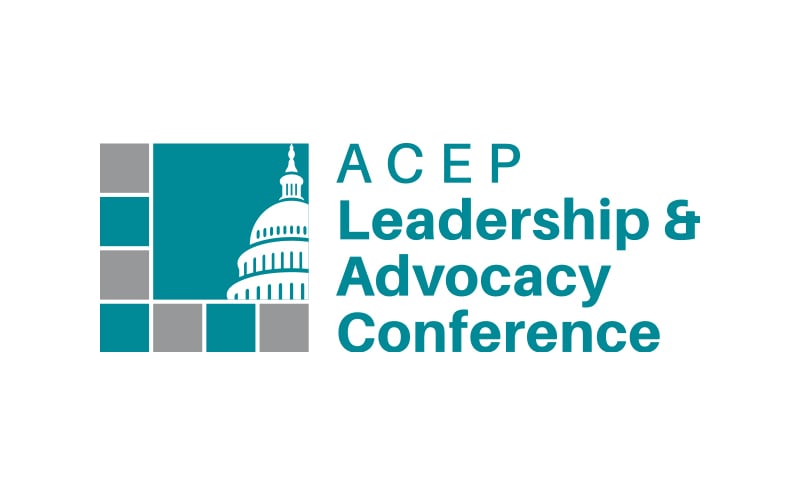
ACEP Leadership and Advocacy Conference
One of my favorite events each year is the American College of Emergency Physician Leadership and Advocacy Conference (LAC). It was held in Washington, DC at the Grand Hilton, May 5-8, 2019. This is a recently renovated hotel located in downtown Washington just blocks from the Mall and many of the monuments and museums, not to mention great eateries. There were 550 attendees this year representing 47 different states. The Tennessee chapter funds up to one resident from each Emergency Medicine training program in Tennessee to attend.
Generally, on the Sunday prior to LAC there is a meeting for the Chapter Executives. This is a great opportunity for Chapter Executives to network with ACEP staff and other Chapter Executives. As well this year, there was a Chapter Leadership Session which included discussions regarding chapter strategic planning, constructing successful legislative initiatives, developing new chapter leadership and member engagement.
The Monday meeting started with discussions regarding the role that ACEP and we as members play in advocacy for emergency medicine at the national level.
There was a presentation about promoting a culture of diversity by trauma surgeon, Brian Williams, MD. This was a moving discussion about the black experience in the United States from the perspective of a black military trained trauma surgeon.
This was followed by a very interesting and entertaining presentation about developing leaders by James Adams, an emergency medicine physician who is also the Chief Medical Officer (CMO) of Northwestern Medicine. Take home message for me: read Good to Great, by Jim Collins.
Theresa Amato, MD, Chair of Emergency Medicine at Long Island Jewish Forest Hills provided a presentation regarding driving change within the emergency department.
Mike Granovsky, MD, Chair of ACEP Reimbursement Committee, was the moderator of a panel discussion regarding payors and payments. Participants included Lynn Massingale, MD TeamHealth Co-Founder and Chairman; Reena Duseja, MD an emergency physician and CMO for Quality Measures and Value Based Services at the Center for Medicare and Medicaid Services (CMS); and Rebecca Parker, MD ACEP Past President and CMO for the Affairs Office for Envision Physician Services.
What we learned:
- Many patient complaints about surprise billing are actually about deductible charges.
- Insured patients subsidize all other patients
- Uninsured patients pay 23% of the cost.
- Medicaid pays 50% of the cost.
- Medicare pays 97% of the cost
- Commercial payors pay 273% of the cost
- This payment structure is necessary to cover the fact that there are a tremendous number of Medicaid, Medicare and Uninsured patients and none of the pay the average cost of that care
- CMS appreciates the burden associated with the use of electronic medical records (EMRs) and pay for performance programs. Many of these programs have been legislated by congress and CMS is carrying them out. CMS is trying to modify the programs to make them less burdensome and have reduced the number of overall measures.
- Health care delivery systems are participating in the Bundled Payment Care Initiative pilot with CMS. These are payments for episodes of care and include the acute and post episode care.
- There is a program attempting to curb the opioid crisis within the Envision System.
Kevin Klauer, DO, Member of the ACEP Board of Directors, and CMO of TeamHealth Hospital Based Services, discussed how to engage your C-Suite in strategic initiatives. His message was that listening and effective communication are critical. Another of his points is that if you are pitching a project or new idea to the C-Suite include: a break-even analysis, a discussion of opportunity costs, economies of scale and returns on investment.
There was a panel discussion on policy considerations in firearm injury prevention. The panel included a democratic congressional aide, a congressional reporter for the Los Angeles Times and a Rand Corporation spokesman who was also the former Police Chief of Orlando, Florida. We learned about congressional priorities in this area and how they are being influenced by the upcoming 2020 elections. As well, there is very little sound rigorous research in this area. There is a bill in Congress for fifty million dollars to fund research in gun related violence.
This was followed by a discussion titled, “Practice to Policy: Emergency Physicians in the Federal Government”. Speakers were Gerald Cox, MD, Deputy Under Secretary for Health Administration, Veterans Health Administration; and Roneet Lev, MD, an emergency medicine physician, Past-President of California ACEP and who is currently the Chief Medical Officer of the White House Office of National Drug Control Policy. Dr Cox provided an overview of the Veterans Health Administration and of his extensive career in the military and the Veterans Health Administration. Dr. Lev’s previous research examined the causes of drug overdoses in San Diego. She provided data regarding the opioid epidemic and programs being developed and implemented by her office. Both speakers expressed the opinion that emergency medicine physicians are well qualified to be leaders in federal leadership positions.
The next session was a group of congressional staffers discussing Out of Network also commonly known as Surprise Billing. This included two Health Policy Advisors for two US Senators and a Deputy Chief of Staff for a Representative. It is clear this is a bipartisan issue in Washington and there is going to be legislation advanced to address it. It is likely this legislation will include:
- A definition of what surprise billing is
- Surprise billing is not permissible
- How the payment is to be settled; leading candidates are:
- Arbitration
- A benchmark
- It cannot conflict with existing state laws in place to address this.
There were then three break-out sessions which included:
- State Legislative Panel Perspectives on Advocacy from EM Physicians Who Are or Have Been State Legislators
- Quality: Advanced Alternative Payment Models (by a CMS representative)
- How an ACEP Resolution Becomes a Law
The second day is committed to making visits with our elected officials and/or their aides on the Hill. There was a talk about what influences our elected officials with respect to making decisions on issues and how they vote. It turns out that data suggests that constituents and professional organizations visiting elected officials in Washington or in the home district has substantial influence. It also turns out that meetings with health policy assistants and legislative aides has more influence on the votes than meeting with the elected official. These young, remarkably bright, and often well-informed individuals draft the legislation and advise the elected official on how to vote. As well, there was a talk about the appropriate etiquette for these visits.
The two issues we discussed on the Hill were funding for mental health and a solution for out of network or surprise billing. There are bills in the Senate (S 1334) and the House (H 2519) titled “Improving Mental Health Access from the Emergency Department Act.” These bills provide the states with grants to develop or implement programs based on pilot programs developed in the states which show promise with respect to improving access or improving the experience for mental health patient in the emergency department requiring a higher level of care. We requested the Senators and Representatives support these bills.
There are work groups in the House and the Senate working to resolve out of network or surprise billing. We learned earlier that for one emergency medicine company nine out of ten complaints about bills were actually bills for the deductible requirement in their medical insurance. Is turns out that in the Affordable Care Act (Obama Care), there is a provision that allows the deductible for out of network services to be higher than the deductible for in network services. Thus, if a patient receives services from an emergency medicine group that is not contracted with the insurance company the patient is receiving services out of network and has a higher deductible leading to a “surprise bill.” We are asking that the difference in deductible for emergency services be eliminated. Secondly, we asked that if a conflict develops between the insurance company and the emergency physician with respect to billed services, the patient be removed from the conflict and that it be referred to independent arbitration between the emergency physician and the insurance company. We asked that arbitration be “baseball-style” (high-low with the arbitrator using pricing such as the Fair Standard Pricing Guide). Lastly, there has been a lot of discussion about transparency. We are asking there be increased transparency with respect to the insurance companies. We are asking in and out of network co-pays and deductibles be put on all insurance cards distributed to patients.
The 550 emergency medicine physicians participated in 352 meetings with Senators, Representatives and/or their aides. Reception ranged from an enthusiastic embrace to concern about how these requests would be scored by the Congressional Budget Office.
I find this to be an educational and useful meeting. The camaraderie between the attendees is palpable and it provides an opportunity for networking and for our voices to be heard in Washington. It is scheduled to be held at the same location next year April 26-29, 2020. I encourage you to pencil it into your schedule and let’s grow ACEP representation. If you have questions or comments please feel free to direct them to me.
Thom R. Mitchell, MD, FACEP
Newsletter Editor



